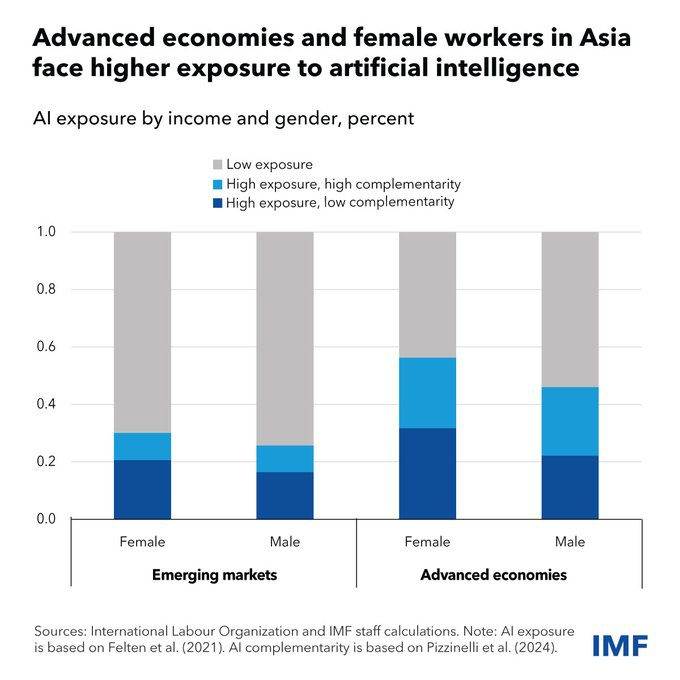AI Exposure in Advanced Economies and Female Workers
The International Monetary Fund (IMF) has recently highlighted that advanced economies and female workers in Asia face higher exposure to artificial intelligence (AI). This revelation underscores the urgent need for reskilling and other policy tools to mitigate the potential adverse effects. As AI continues to permeate various sectors, it is crucial to understand its impact on different demographics and economies.
According to a report by IDC Asia/Pacific, the AI-driven transformation is expected to augment 50% of the Asia-Pacific workforce by 2025. This growth in AI and generative AI (GenAI) investments by technology buyers indicates a significant shift in enterprise operations and job roles. The report also discusses the anticipated advances in AI and GenAI technologies and their applications in enterprise software, highlighting the increased usage of these technologies in enterprises across the region.
Navigating the AI Tsunami in Asia
IMF Managing Director Kristalina Georgieva has likened the impact of AI on the global labor market to a tsunami. She emphasized that AI is expected to affect around 60% of jobs in advanced economies and 40% worldwide within the next two years. This could lead to a tremendous increase in productivity if managed well, but it also poses risks such as misinformation and increased inequality in society. Georgieva’s call for swift action to address these challenges is a crucial step towards ensuring that the benefits of AI are equitably distributed.

AI’s Dual Impact on Job Creation and Destruction
Sanjeev Sanyal, a member of EAC-PM, has pointed out that AI will both create and destroy jobs, particularly impacting highly skilled individuals. He emphasized the need for careful adoption and regulation of AI technologies. AI has the potential to revolutionize education by making lectures available online and updating curriculums seamlessly. However, the regulatory approaches to AI in the US and Europe differ, highlighting the need for human oversight to ensure ethical and effective implementation.
AI Impact on Indian Job Market
An IMF paper has revealed that Indian jobs’ exposure to AI is lower than the rest of the world. This analysis provides a social and economic perspective on AI’s role in job markets, especially in countries like India. The AI Preparedness index and the analysis of job exposure to AI and its impact on employment and productivity are crucial for policymakers, economists, and financial professionals.
Reskilling and Upskilling: The Key to Mitigating AI’s Impact
Gartner has highlighted that 80% of engineers could lose their jobs if they don’t upskill by 2027. Upskilling in AI Engineering is essential to keep up with the rapid advancements in AI technologies. The AI engineer possesses a unique combination of skills in software engineering, data science, and AI/machine learning (ML), which are highly sought after in the current job market.
AI’s Role in Reshaping Economic Geography
A study has pointed out that AI could reshape the economic geography of America, much like other technological revolutions. The transformative force of AI could change the nation’s economy and politics, impacting smaller cities adopting AI and reshaping population and labor markets.

Changing Skill Requirements by 2030
According to LinkedIn’s Chief People Officer, Teuila Hanson, skill requirements for jobs in India have evolved significantly since 2016, with AI driving faster changes. By 2030, these changes are expected to increase further. Indian professionals are adopting a growth mindset, spending more time on learning than the global average. Companies are prioritizing people skills and AI literacy in candidates, indicating a significant shift in required skill sets.
AI Disruption and Workforce Dynamics
A survey by Great Learning reveals that a vast majority of young professionals fear AI disruption. With AI becoming more pervasive, insecurities over job displacement have emerged as a major concern. The survey finds artificial intelligence and machine learning to be the most sought-after skills in FY25, as many seek to upskill to remain relevant.
Related Articles
- Why AI is Not a Threat to Knowledge Workers
- AI in Intellectual Property Infringement: Risks and Remedies
- AI-Powered Cyber Attacks: The New Big Issue
- Is AI Really Going to Replace Us? Exploring the Impact of AI on Jobs
- The Age of Generative AI: How to Land Exciting New Careers in This Era
Looking for Travel Inspiration?
Explore Textify’s AI membership
Need a Chart? Explore the world’s largest Charts database
